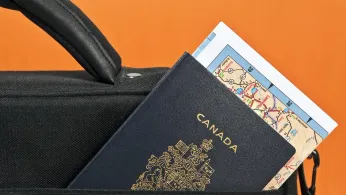
3 hours ago
Canada Issues Travel Warning to Passport Holders with Gender-Neutral 'X' Marker About U.S. Entry
READ TIME: 3 MIN.
The Canadian government has issued a travel advisory warning that citizens holding passports with a gender-neutral ‘X’ marker may face problems at the United States border. The caution comes amid heightened concerns about varying recognition of gender markers across national boundaries and shifting U.S. federal policies affecting transgender and non-binary travelers .
Since 2017, Canada has offered an ‘X’ option on passports to designate a gender other than male or female, a move widely praised by LGBTQ+ advocates as a step toward greater inclusion and recognition of gender diversity . The ‘X’ marker allows passport holders to indicate that their gender identity is non-binary, gender-fluid, or otherwise not exclusively male or female. However, the use of the ‘X’ marker is not uniformly recognized by other countries, leading to potential challenges at international borders.
While the United States previously allowed its own citizens to select an ‘X’ gender marker on federal documents, recent policy reversals and new executive actions have introduced uncertainty for travelers. In January 2025, the White House announced Executive Order 14168, which redefined sex markers on federal documents and instructed agencies to apply a binary understanding of gender in government-issued identification .
Although some court decisions, such as the June 2025 preliminary relief in *Orr v. Trump*, provided limited exceptions for U.S. citizens, these changes do not guarantee recognition for foreign nationals traveling with non-binary or gender-neutral markers .
The Government of Canada’s travel advisory states: “While the Government of Canada issues passports with an ‘X’ gender identifier, it cannot guarantee your entry or transit through other countries. Each country or territory decides who can enter or exit through its borders and the Government of Canada cannot intervene on your behalf if you do not meet entry or exit requirements for the United States” .
Canadian officials emphasize that U.S. border agents have significant discretion when determining who is permitted entry, and that travelers may face additional scrutiny or denial of entry if their documents do not match the expectations or systems used by U.S. authorities .
The advisory has sparked concern among LGBTQ+ rights organizations and advocates, who note that non-binary and gender-diverse individuals already face heightened risks and barriers when traveling internationally. Advocacy groups highlight that inconsistent recognition of gender markers not only creates bureaucratic obstacles but can also expose travelers to misgendering, invasive questioning, and potential discrimination at the border .
“Traveling with documents that reflect your authentic self should not put you at risk,” said a spokesperson from Rainbow Railroad, an organization that supports LGBTQ+ people facing persecution globally. “We urge all governments to work toward harmonized standards that respect the dignity and rights of all travelers."
Reports from travelers suggest that experiences at the U.S. border vary widely. Some Canadian citizens with ‘X’ markers have been allowed entry without issue, while others report additional questioning, delays, or the need to provide supplementary documentation . The ambiguity and unpredictability at the border can cause anxiety and deter non-binary and transgender travelers from crossing into the United States for business, personal, or family reasons.
Community organizations have responded by providing updated travel guidance and resources for those with gender-diverse documentation. The Canadian Centre for Gender and Sexual Diversity, for example, encourages travelers to carry supporting identification and to be prepared for possible questions at the border.
Both Canadian and U.S. government websites recommend that travelers check the latest entry requirements before embarking on international trips. The U.S. Department of State reminds travelers that, as of now, U.S. authorities reserve the right to determine eligibility for entry, regardless of the sex marker listed on a passport .
Travelers who are denied entry or face difficulties are advised to contact their nearest Canadian consulate or embassy for support and to report their experiences, which can help inform future policy advocacy .
LGBTQ+ advocates continue to call for international dialogue and policy harmonization to protect the rights of gender-diverse travelers. The Canadian government has reiterated its commitment to promoting the rights of LGBTQ+ individuals abroad, but also acknowledges the limits of its influence over foreign entry requirements .
As governments around the world grapple with evolving understandings of gender, the situation remains fluid. Advocates urge travelers to remain informed, exercise caution, and seek assistance when needed, while calling on policymakers to prioritize the safety and dignity of all individuals, regardless of gender identity.






